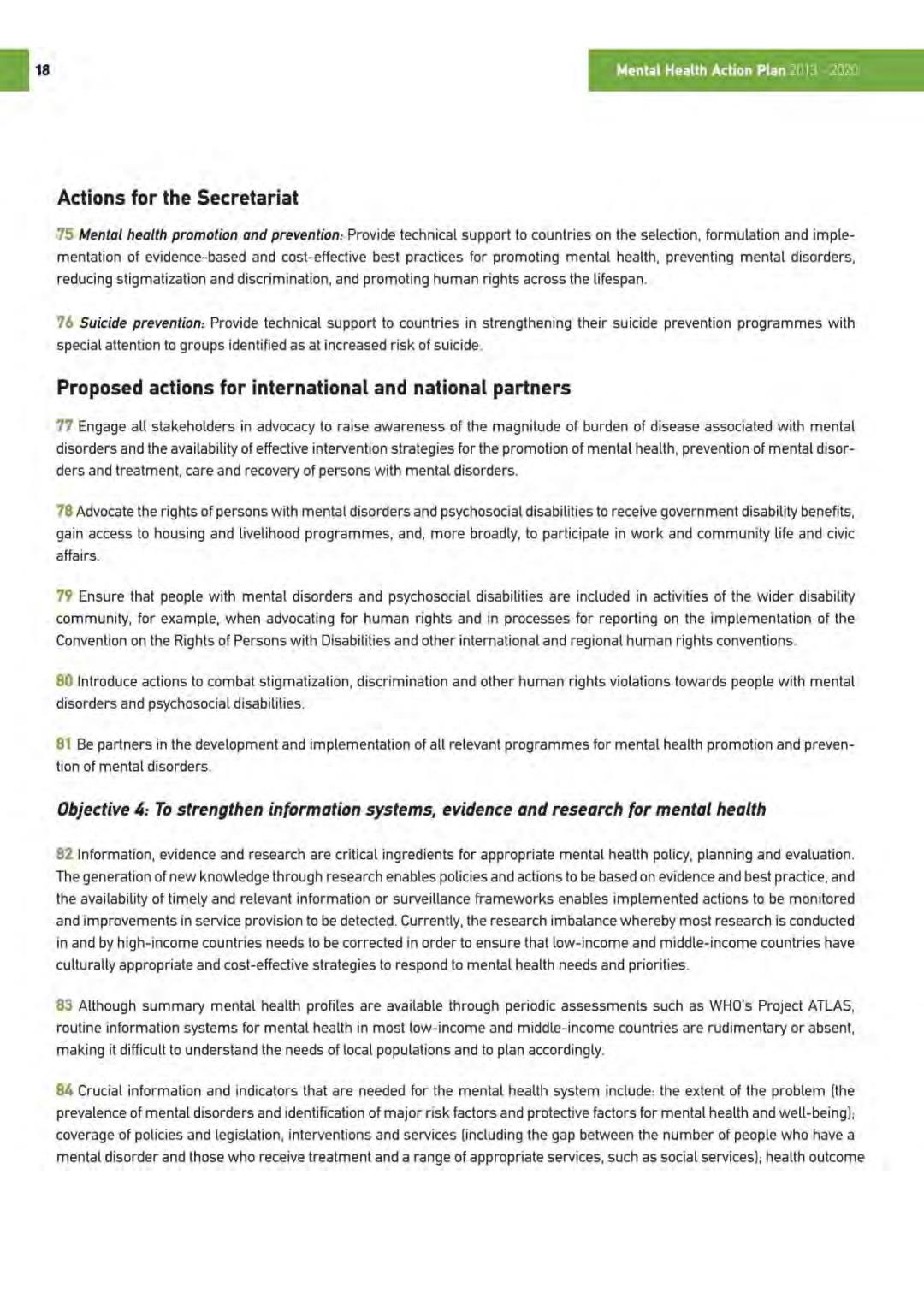正在加载图片...

18 Mental Health Action Plan 2013-2020 Actions for the Secretariat 75 Mental health promotion and prevention:Provide technical support to countries on the selection,formulation and imple- mentation of evidence-based and cost-effective best practices for promoting mental health,preventing mental disorders, reducing stigmatization and discrimination,and promoting human rights across the lifespan. 76 Suicide prevention:Provide technical support to countries in strengthening their suicide prevention programmes with special attention to groups identified as at increased risk of suicide. Proposed actions for international and national partners 77 Engage all stakeholders in advocacy to raise awareness of the magnitude of burden of disease associated with mental disorders and the availability of effective intervention strategies for the promotion of mental health,prevention of mental disor- ders and treatment,care and recovery of persons with mental disorders. 78 Advocate the rights of persons with mental disorders and psychosocial disabilities to receive government disability benefits, gain access to housing and livelihood programmes,and,more broadly,to participate in work and community life and civic affairs. 79Ensure that people with mental disorders and psychosocial disabilities are included in activities of the wider disability community,for example,when advocating for human rights and in processes for reporting on the implementation of the Convention on the Rights of Persons with Disabilities and other international and regional human rights conventions. 80 Introduce actions to combat stigmatization,discrimination and other human rights violations towards people with mental disorders and psychosocial disabilities 81 Be partners in the development and implementation of all relevant programmes for mental health promotion and preven- tion of mental disorders. Objective 4:To strengthen information systems,evidence and research for mental health 82 Information,evidence and research are critical ingredients for appropriate mental health policy.planning and evaluation. The generation of new knowledge through research enables policies and actions to be based on evidence and best practice,and the availability of timely and relevant information or surveillance frameworks enables implemented actions to be monitored and improvements in service provision to be detected.Currently,the research imbalance whereby most research is conducted in and by high-income countries needs to be corrected in order to ensure that low-income and middle-income countries have culturally appropriate and cost-effective strategies to respond to mental health needs and priorities. 83 Although summary mental health profiles are available through periodic assessments such as WHO's Project ATLAS, routine information systems for mental health in most low-income and middle-income countries are rudimentary or absent, making it difficult to understand the needs of local populations and to plan accordingly. 84 Crucial information and indicators that are needed for the mental health system include:the extent of the problem (the prevalence of mental disorders and identification of major risk factors and protective factors for mental health and well-being) coverage of policies and legislation,interventions and services (including the gap between the number of people who have a mental disorder and those who receive treatment and a range of appropriate services,such as social services);health outcome18 Mental Health Action Plan :'UI < J _'.: ! Actions for the Secretariat 75 Mental health promotion and prevention: Provide technical support to countries on the selection, formulation and implementation of evidence-based and cost-effective best practices for promoting mental health, preventing mental disorders, reducing stigmatization and discrimination, and promoting human rights across the lifespan. 76 Suicide prevention: Provide technical support to countries in strengthening their suicide prevention programmes with special attention to groups identified as at increased risk of suicide. Proposed actions for international and national partners 17 Engage aLI stakehoLders in advocacy to raise awareness of the magnitude of burden of disease associated with menial disorders and the availability of effective intervention strategies for the promotion of mental health, prevention of mental disorders and treatment, care and recovery of persons with mental disorders, 78 Advocate the rights of persons with mental disorders and psychosocial disabilities to receive government disability benefils, gain access to housing and livelihood programmes, and, more broadly, to participate in work and community lile and civic affairs. 79 Ensure that people with mental disorders and psychosocial disabilities are included in activities of the wider disability community, for example, when advocating for human rights and in processes for reporting on the implementation of the Convention on the Rights of Persons with Disabilities and other international and regional human rights conventions. 80 Introduce actions to combat stigmatization, discrimination and other human rights violations towards people with mental disorders and psychosocial disabilities. 81 Be partners in the development and implementation of all relevant programmes for mental health promotion and prevention of mental disorders. Objective 4, To strengthen information systems, evidence and research for mental health 82 Information, evidence and research are critical ingredients for appropriate mental health policy, planning and evaluation. The generation of new knowledge through research enables policies and actions to be based on evidence and best practice, and the availability 01 timely and relevant information or surveillance frameworks enables implemented actions to be monitored and improvements in service provision to be detected. Currently, the research imbalance whereby most research is conducted in and by high-income countries needs to be corrected in order to ensure that low-income and middle-income countries have culturally appropriate and cost-effective strategies to respond to mental health needs and priorities. 83 Although summary mental health profiles are available through periodic assessments such as WHO's Project ATLAS, routine information systems for mental health in most low-income and middle-income countries are rudimentary or absent, making it difficult to understand the needs of local populations and to plan accordingly. 84 Crucial information and indicators that are needed for the mental health system include: the extent of the problem [the prevalence of mental disorders and identification of major risk factors and protective factors for mental health and well-being); coverage of policies and legislation, interventions and services !including the gap between the number of people who have a mental disorder and those who receive treatment and a range of appropriate services. such as social services): health outcome